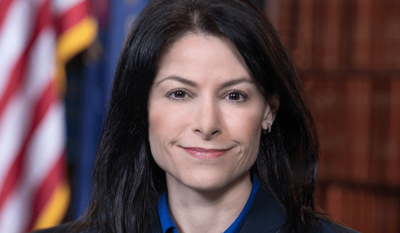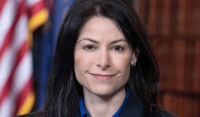
Nessel
GRAND RAPIDS, Mich. - Michigan Attorney General Dana Nessel says President Donald Trump was premature to file suit against her in an effort to block the state from joining climate change litigation against the oil industry.
Nessel on June 20 in Michigan federal court filed a motion to dismiss Trump's lawsuit against her, which seeks a judge's ruling affirming his executive order that forbids climate cases by state and local government officials - dozens of which have already been filed.
After issuing his EO, Trump went to court to block possible lawsuits from Hawaii and Michigan. Hawaii Attorney General Anne Lopez went ahead and filed one anyway, but Nessel has not - possibly while she waits on pending legislation or a Michigan Supreme Court ruling that would let her office use a state law in ways she currently can't.
Nessel calls Trump's suit a "speculative and preemptive attack on state sovereignty - contingent on future events that may never occur..."
"Michigan has brought no state law claims that this Court can assess to determine whether they are preempted or unconstitutional - or whether this Court should abstain from such proceedings util state courts have the opportunity to determine whether any claims Michigan pursues are cognizable under state law," the motion to dismiss says.
Plaintiff lawyers hired by government officials on contingency fees crafted their climate complaints to stay out of federal courts by making state-law claims like consumer deception and public nuisance.
The suits claim consumers would not have burned as many fossil fuels as they did had the oil industry been upfront about the harms emissions could cause. But six state judges have refused to issue rulings that would essentially set new emissions standards.
The supreme courts of Hawaii and Colorado, however, have allowed cases in those states to proceed. Trump's lawsuit seeks to stop the spread of this litigation, arguing state and local officials are sticking their noses where they don't belong.
"Congress delegated to EPA the authority to determine whether and how to regulate greenhouse gas emissions, thereby displacing federal common law claims and occupying the field of interstate air pollution regulation," the suits against Hawaii and Michigan say.
A group of 14 attorneys general has filed a lawsuit of its own against the executive order in Seattle federal court.
The Mackinac Center for Public Policy previously reported Nessel had picked private lawyers to sue companies like Exxon and Chevron but nothing has been filed yet. In the meantime, she hopes to push SB 134 through the state House of Representatives, after Senate Democrats approved it 19-18 earlier this month.
The bill would change how courts have interpreted the Michigan Consumer Protection Act. Under two older rulings by the state Supreme Court, plaintiffs can't bring MCPA claims against companies already regulated by state and federal agencies (and emissions are regulated by the federal Environmental Protection Agency).
That would change under this bill, which sits in the House Judiciary Committee. Republicans hold a small majority there and represent the last chance to stop the bill.
Nessel wants the law changed so she can investigate Eli Lilly over insulin prices under the MCPA, but it would apply to other avenues of litigation like climate change. She's also asking the state Supreme Court to make the change in an appeal in the Eli Lilly case.
She and supporters, like Michigan's plaintiff lawyer group, want state Supreme Court justices, now mostly Democrats, to undo the rulings of their Republican predecessors.
The Michigan Chamber of Commerce is among the opposition to Nessel in the state Supreme Court, writing in an amicus brief, "Layering on another level of lawsuits does little to protect consumers and much to burden Michigan businesses - all while lining the pockets of lawyers on both sides of the dispute."
A South Carolina judge recently held a hearing on how Trump's executive order impacts Charleston's case. And six judges, including two in Maryland and one in New York, have expressed concerns that though the cases make claims under consumer protection laws, they actually impact the global energy market.
Judge Videtta Brown, in Baltimore's case, said the litigation goes beyond the limits of Maryland law, or whatever states other cases are filed in.
"This Court holds that the U.S. Constitution's federal structure does not allow the application of state court claims like those presented in the instant cases," Judge Steven Platt wrote in tossing Annapolis' case.
"The States such as Plaintiffs here... can participate in the efforts to limit emissions collaboratively, but not in the form of litigation... If states and municipalities [or] even private parties are dissatisfied with the federal rulemaking or the outcome of cases, they may seek federal court review."








